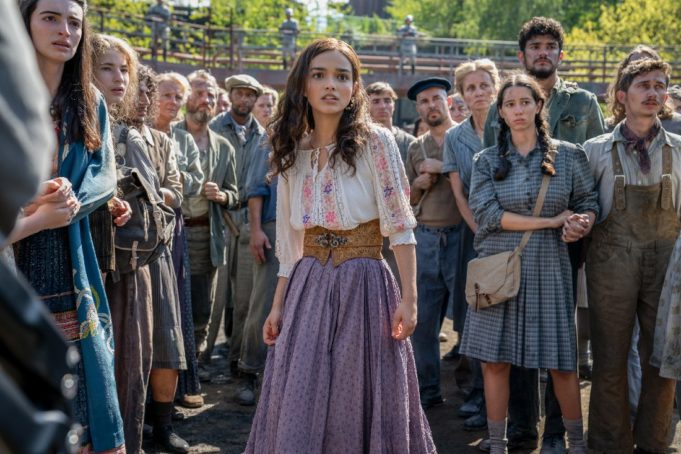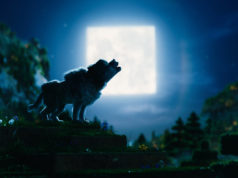In the novel The Hunger Games, Katniss Everdeen describes herself as being small-statured, olive-skinned, and dark-haired, so of course, when they made the movie of Suzanne Collins’ book, they cast tall, blonde, athletic Jennifer Lawrence in the role. And yes, she was great, but still, you could understand why some people were put out by the casting.
The prequel to Collins’ trilogy, sporting the super-unwieldy title of The Hunger Games: The Ballad of Songbirds & Snakes, rectifies this by casting Rachel Zegler, who physically resembles the Katniss of the books. She’s one reason why I like this prequel much better than I expected to.
The film takes place more than 60 years before the events of The Hunger Games, as the Capitol is considering phasing out the lethal tournament because nobody is watching on TV. The future dictator of Panem, Coriolanus Snow (Tom Blyth) is here a pretty and somewhat sympathetic young man who’s randomly assigned to mentor musician Lucy Gray Baird (Zegler) after she’s not-so-randomly picked to fight for District 12 in the games. Unlike Katniss, she knows how to play to the cameras, and Coriolanus just happens to have ideas to make the TV broadcast more interactive by letting viewers at home donate to contestants who charm them like Lucy Gray can — she goes by her first and middle names. The smitten Coriolanus genuinely wants to help her win, but he’s also looking to curry favor with the government and support his once-rich family who are about to be evicted from their home.
This film looks considerably better than any of the original series. Holdover director Francis Lawrence and his creative team seem more comfortable with the 1930s-style decor here than with the original series’ futuristic look. They give us brutalist buildings, Art Deco posters urging loyalty to the state, trains with wooden benches instead of seats, and an impressive Capitol monument of a giant sword-wielding woman. All this adds up to a more effective use of the Nazi-Soviet aesthetic than the Fantastic Beasts movies have ever managed.
In addition, the Hunger Games are more gruesome because of the kids that the government is forcing into action, as Lucy Gray’s fellow tributes include one girl with Down syndrome, one who can’t stop coughing, and one who can’t stop crying (although one of those turns out to be tougher than she looks). The fight sequences are better choreographed than in any previous installment of the series, and the violence doesn’t spare the mentors. Even outside the Hunger Games, a scene backstage at a concert unfolds with plausible haste as one character’s years-long grudge and a couple of bad decisions lead to several deaths.
Jason Schwartzman adds some badly needed levity as the Games’ hilariously venal TV host, who performs cheesy magic tricks on the air and spends his off-camera time rearranging his restaurant reservations. Viola Davis makes a superb grotesque villain, grinning demonically under too much makeup, a fright wig, and eyes of different colors. Peter Dinklage portrays the inventor of the Hunger Games, whose creation has turned him into an embittered morphine addict, and the scene where he tells Coriolanus why he hates him boasts two properly nasty revelations, especially if you haven’t read the book. Amid this company, Zegler proves worthy of her star turn, working with an Appalachian accent and alertly evading murder attempts in the Games while cutting that quality with bits of humor. At the reaping ceremony, Lucy Gray grabs the attention of all Panem by directing a feral “Kiss my ass!” at the crowd and then following that up with a ladylike curtsy. Also, it turns out the star of West Side Story can sing bluegrass, too, so now we know.
On the downside, the brilliant conceit of the original books was a commentary on mid-2000s pop culture rolling on while the Iraq war was raging, and Collins hasn’t come up with a similarly clever or timely idea to underpin this story. The material involving Coriolanus’ fashion designer cousin (Hunter Schafer) takes up too much time for a subplot that amounts to an Easter egg for the original series, and the ending is too drawn out. With all this, I find this to be the most sustained piece of filmmaking in the entire Hunger Games series, a stand-alone installment with a satisfying self-contained story for its new heroine.
The Hunger Games: The Ballad of Songbirds & Snakes
Starring Rachel Zegler and Tom Blyth. Directed by Francis Lawrence. Written by Michael Arndt and Michael Lesslie, based on Suzanne Collins’ novel. Rated PG-13.













